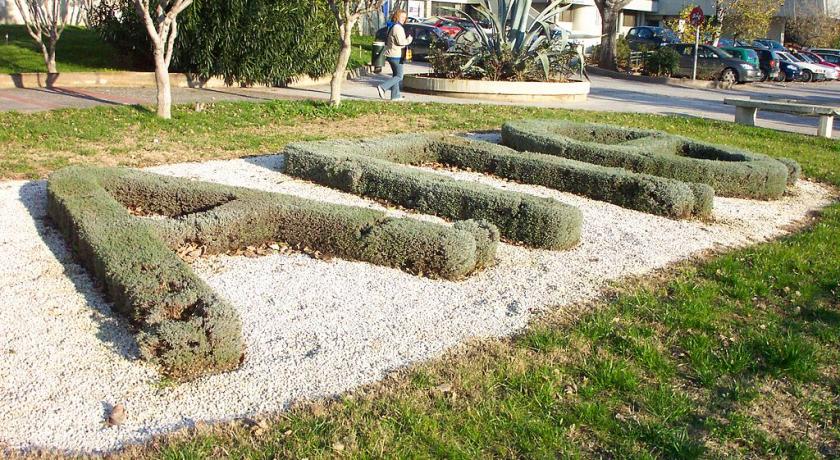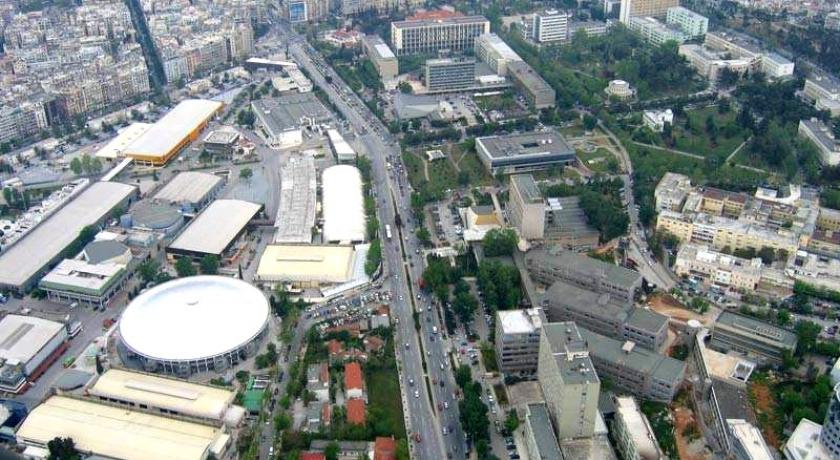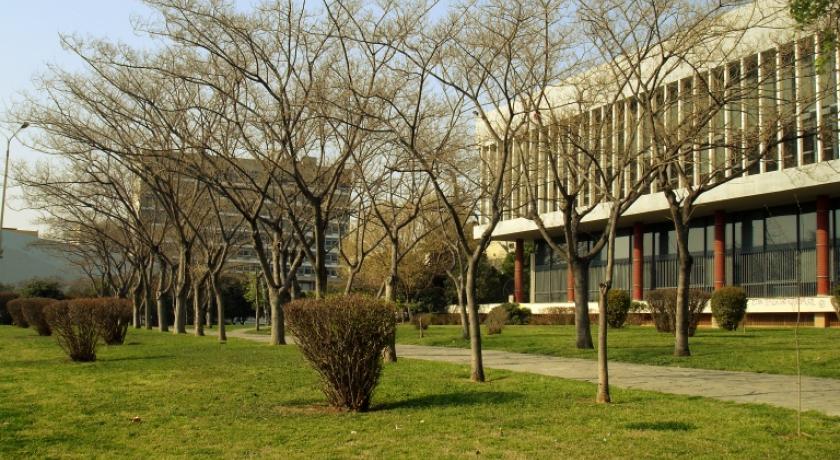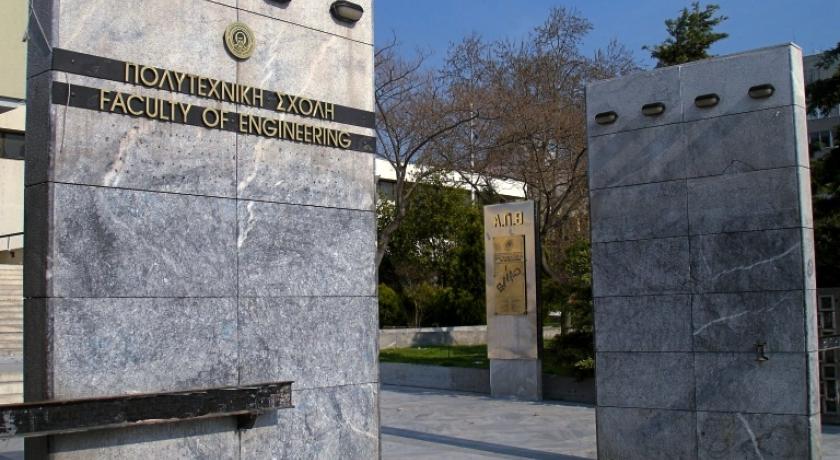Description
The Aristotle University of Thessaloniki (A.U.Th.; often called the Aristotelian University or University of Thessaloniki; Greek: Αριστοτ╬Łλειο Πανεπιστ╬«μιο Θεσσαλον╬»κης) is the sixth oldest and among the most highly ranked tertiary education institutions in Greece. It is named after the philosopher Aristotle, who was born in Stageira, about 55 km east of Thessaloniki.
It is the largest university in Greece and in the Balkans. Its campus covers 230,000 square metres in the centre of Thessaloniki, with additional educational and administrative facilities elsewhere.
As of 2014, there is a student population of approximately 40,000 active students enrolled at the university (31,000 at the undergraduate level and 9,000 in postgraduate programmes of which 3,952 at Doctoral level) and 2,366 faculty members. There are additionally 248 members of the Special Laboratory Teaching Personnel, 213 members of the Special Technical Laboratory Personnel. The administrative staff consists of 400 permanent employees and 528 subcontractor employees that are contracted by the university.
The language of instruction is Greek, although there are programs in foreign languages and courses for international students, which are carried out in English, French, German, and Italian.
History
The Aristotle University of Thessaloniki was founded in 1925 during the premiership of Alexandros Papanastassiou and was legislated under Law 3341/14-6-25. It was the second Greek university to be founded after the University of Athens, which was established in 1837. The university was built on top of the remains of what had once been the Jewish cemetery in Thessaloniki, until the cemetery's tragic destruction during the Nazi occupation.
According to Eleftherios Venizelos' plans following the end of the World War I, Smyrni was intended to be the seat of the second Greek university, while the third university was to be established in Thessaloniki. However, Smyrni was not part of Greece at the time and the plans fell through after the outcome of the Greco-Turkish War in Asia Minor. Nevertheless, in 1924, Alexandros Papanastassiou decided to found a university in Thessaloniki in order to boost the local economy and culture.
The chronological development of the university, which was renamed the Aristotle University of Thessaloniki in 1954, can be divided into three stages, each covering a period of approximately 25 years.
First stage (1926–1950)
During the first stage of its operation (1926–1950), the development focused on those Schools which were generally accepted as constituting one educational Institute, namely the Faculty of Philosophy, the Faculty of Physics and Mathematics, the Faculty of Law and Economics, the School of Theology and the Medical School. The first stage of development ended with the foundation of the Faculty of Veterinary Medicine in 1950, which was the only faculty of Veterinary Medicine in Greece for many years. After this period, some of the aforementioned faculties were extended by integrating more departments. In more detail, the Departments of Pharmacy and Dentistry were founded in 1955 and 1959 respectively and they were incorporated into the Medical School. Moreover, the Faculty of Philosophy was expanded by integrating the Institutes of Foreign Languages (English, French, German and Italian).
Second stage (1951–1975)
During the second stage (1951–1975) the focal point of development was the Faculty of Engineering, also known as the Polytechnic Faculty. At the beginning, this faculty constituted an independent institute also called the Polytechnic or Technical University. Therefore, for the first fifty years of its operation the Aristotle University consisted of two distinct institutes which operated independently. Subsequently these two educational institutes where unified. The various Schools within the Faculty of Engineering were founded in the following order: School of Civil Engineering (1955–56), School of Architecture (1956–57), School of Rural and Surveying Engineering (1962–63), School of Mechanical and Electrical Engineering (1972–73), School of Chemical Engineering (1972–73), School of Mathematics, Physics and Computational Sciences (1982–83) and School of Urban-Regional Planning and Development Engineering (2004). The School of Mechanical and Electrical Engineering was split in two independent schools (School of Mechanical Engineering and School of Electrical and Computer Engineering) in 1976.
Third stage (1975–present)
Finally, during the third stage of its development (1975-today), new schools and departments were founded along with the aforementioned Engineering Schools. Moreover, the university acquired a small number of departments which operated in the past as independent institutes of Higher Education. During this period, the Faculty of Fine Arts was established, along with all its constituent Schools (Drama, Film Studies, Music Studies, Visual and Applied Arts). Additionally, the School of Journalism and Mass Media Studies and the School of Physical Education and Sports Sciences were created as independent schools. Overall, the third stage of development of the Aristotle University is characterized not only by the establishment of new Faculties, Schools and Departments, but also by many major changes in the structure of the university itself. These changes include the downgrade of some former Faculties into Schools or Departments and the upgrade of others.
Today, the Aristotle University comprises 12 Faculties, 36 schools, and numerous other units (such as laboratories, study rooms, libraries, clinics, research centres etc.), which make it the largest university in Greece and southeastern Europe in terms of number of staff, undergraduate and postgraduate students and the facilities offered. According to the significant Jewish past and present of Thessaloniki the Aristotle University planned together with the Jewish community of Thessaloniki in 2014, the reopening of the Faculty of Jewish Studies. A former Jewish faculty was abolished 80 years before by the Greek dictator Ioannis Metaxas. This new faculty took in October 2015, her work on with leading professor Georgios Antoniou. On the University campus a monument commemorating the old Jewish cemetery was unveiled also in 2014. The campus was built partially on this old cemetery.
Emblem
The emblem of the Aristotle University is Demetrius of Thessaloniki.
Departments and faculties
The university includes 11 faculties, consisting of 36 Schools:
History and Affiliations of Schools
- The School of Urban-Regional Planning and Development Engineering is located in Veria.
- Part of the School of Physical Education and Sports Sciences is located in Serres.
- The Faculty of Medicine is strongly associated with the AHEPA University Hospital.
- Philosophy is typically taught in conjunction with Pedagogy on Greek Universities, unlike foreign counterparts.
Research
The Aristotle University of Thessaloniki performs a great deal of research in a variety of scientific fields. It is in constant and close cooperation with universities, organizations and research centres both in Greece and abroad. The large number of its faculties and its approximately 250 laboratories enable scientists of the Aristotle University of Thessaloniki to carry out a variety of research projects with great success. During the past 12 years, 4500 research programs were undertaken and realized with the participation of more than 10000 members of the academic community and several external collaborators.
During the past three years, 985 researchers – distinguished scientists – have provided educational and research services in collaboration with a total of 7,263 external scientific associates for the implementation of 3,151 International, European and National Research and Technological Development (RTD) projects. 1,436 of these partners were universities, research centers and organizations, while 405 were businesses.
Based on recent data from international ranking lists, of 20,372 higher institutions in the world, AUTh moved from the 407th position in 2011 to the 158th in 2012, ranking first among 23 Greek universities. It is worth mentioning that Greece ranks first in the lists for the expenditure per publication per capita as a percentage of GNP, and second (following Ireland) in regard to the amount invested in scientific publications per country (Nature “Top Countries 2011: Scientific Publications”).
In terms of promoting innovation, 32 Patents have been granted during the last 3 years on a national, European and international level.
Finally, AUTh is currently involved in establishing new infrastructure, setting up technology transfer systems, and creating an Interdisciplinary Research Center, in order to facilitate the selection process, as well as the implementation, placement and financing of research projects.
The A.U.TH. Research Committee is a university body which coordinates the research done at the University. It was established in order to satisfy the special needs of research activity and to administer the "Special Account of Research Funds", allocating funding resources to different research programs.
Art and culture
Orchestra
The A.U.Th. Orchestra was established in February 1999 and since then it has participated in a lot of concerts held all over Greece. Since its establishment the interest of the students in it has rapidly increased. The orchestra gives regular concerts for the public of Thessaloniki during the national holidays (25 March, 26 October, etc.) and participates in international festivals and events.
Chorus
The official name of the Aristotle University Chorus is "J. Mandakas Chorus", named after its founder, John Mandakas, who created it in 1953. Nowadays the chorus plays a very important role in the musical and cultural life of the city of Thessaloniki and Greece generally. It also has a constant presence in musical events held all over the world, gaining not only national but also international recognition. For more than 50 years, the A.U.Th. Chorus has given the opportunity to more than 4000 students and other members of the academic community to cultivate their musical talent and to develop strong bonds of friendship and collaboration.
The chorus participates regularly in concerts held during national holidays, various events and festivals (Dimetria, Athens Festival etc.). It also organizes and participates in a lot of meetings of Greek and foreign choruses and orchestras. Finally it has published numerous CDs and DVDs and made a lot of recordings for the Greek national television and radio.
The chorus has contributed decisively in the development of choral music in Greece and in the familiarization of the Greek public with it through the presentation of hundreds of musical works. Furthermore, it has presented many Greek compositions for the first time to the public, helping the Greek composers to achieve international recognition for their compositions.
Since 1964, the Aristotle University Chorus is a member of Europa Cantat, the European Federation of Choruses for young people. The rehearsals take place inside the Student club with the participation of the university Orchestra.
Student Week
The Student Week is a cultural event organized annually inside the university campus. It actually lasts for three or four weeks and is organized by more than 60 student groups, whose interests include dance, music, theater, cinema, sports, poetry, comics, etc. This event is open not only to all the members of the academic community of A.U.Th., but also to all the citizens of Thessaloniki.
Its main objective is to promote students' talents in art and culture and to encourage the free artistic expression of the students as individuals or as a group. It also aims at strengthening the human relations between the students and the personnel of the university. The interest of the students in the Student Week has been rapidly increasing since its establishment in 1999.
Teloglion Fine Arts Foundation
The Teloglion Fine Arts Foundation was founded in 1972 with the donation of the entire fortune, along with a very rich art collection, of Nestor and Aliki Teloglou to the Aristotle University of Thessaloniki. This art collection is now exhibited in a separate building located in the northern side of the university campus. The Foundation is a non-profit organization supervised by the Aristotle University and directed by a board of Trustees composed mainly of university professors.
The art collection included mainly works of Greek artists during the 19th and 20th century and has now been enriched thanks to further donations made by famous persons and artists. At present, the collection includes works from various ancient civilizations, such as statuettes and pottery from the Hellenistic period, Corinthian and Roman pottery, Persian miniatures, Islamic and Chinese vases and dishes, etc. It also includes pieces from modern artists such as the monumental work of art "The World of Cyprus" by Diamandis.
The Foundation's mission is to support all art related studies and research and help the public familiarize itself with art and culture. This is achieved through the organization of numerous conferences, seminars and exhibitions of the museum's artworks.
Student cultural groups
There is a variety of student cultural groups that deal with Drama, Fine Arts, Music, Cinema, Chess, Debate, Comics etc. The cultural groups frequently organize events in which the work of the participants is presented to the public. These events can be theatrical plays, music concerts, debates, chess competitions, art exhibitions and many more. Every student can participate in any cultural group he/she likes and express his talent through art.
Source: https://en.wikipedia.org/wiki/Aristotle_University_of_Thessaloniki
Address
Thessaloniki
Greece
Lat: 40.630828857 - Lng: 22.959222794







